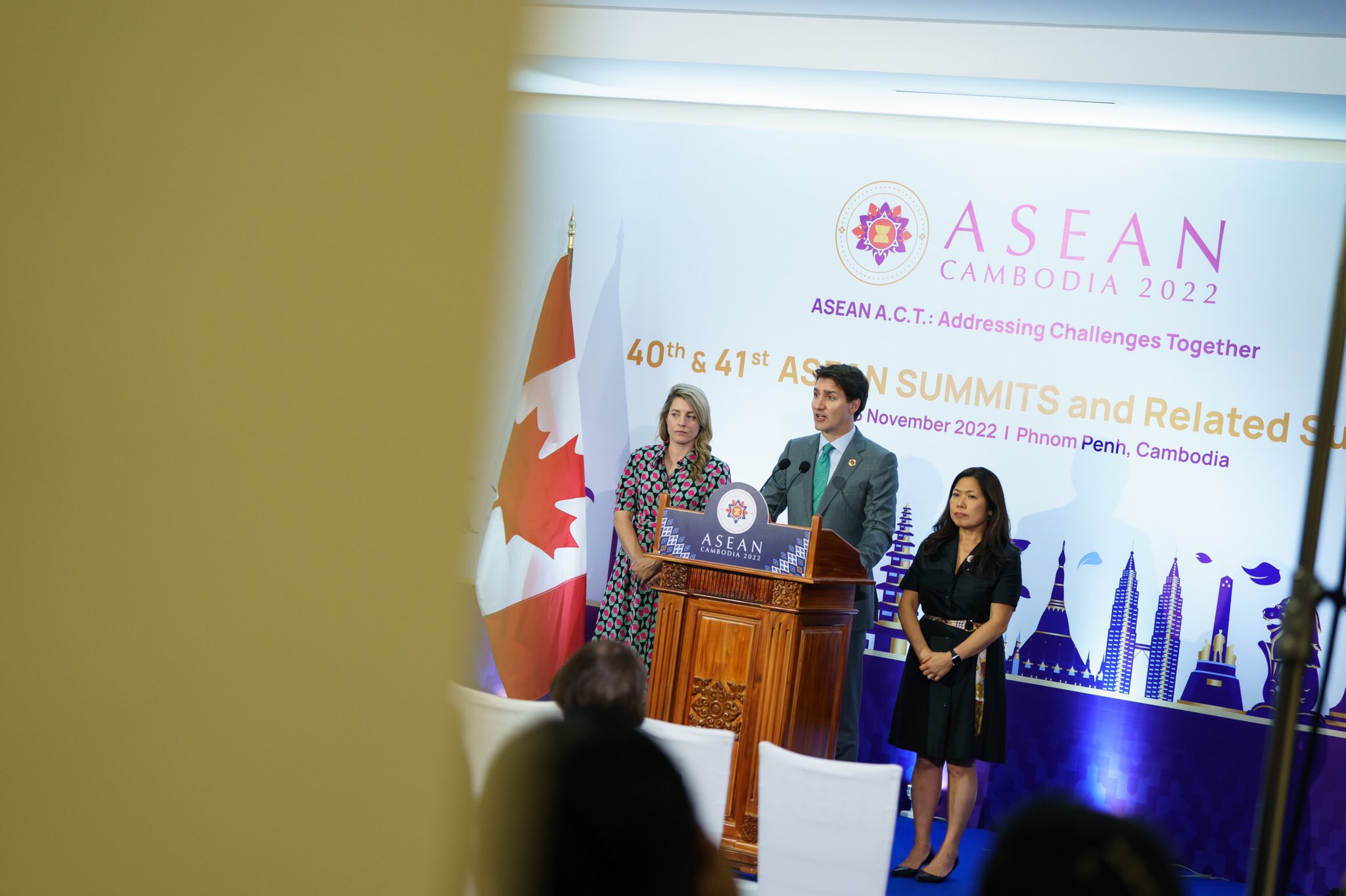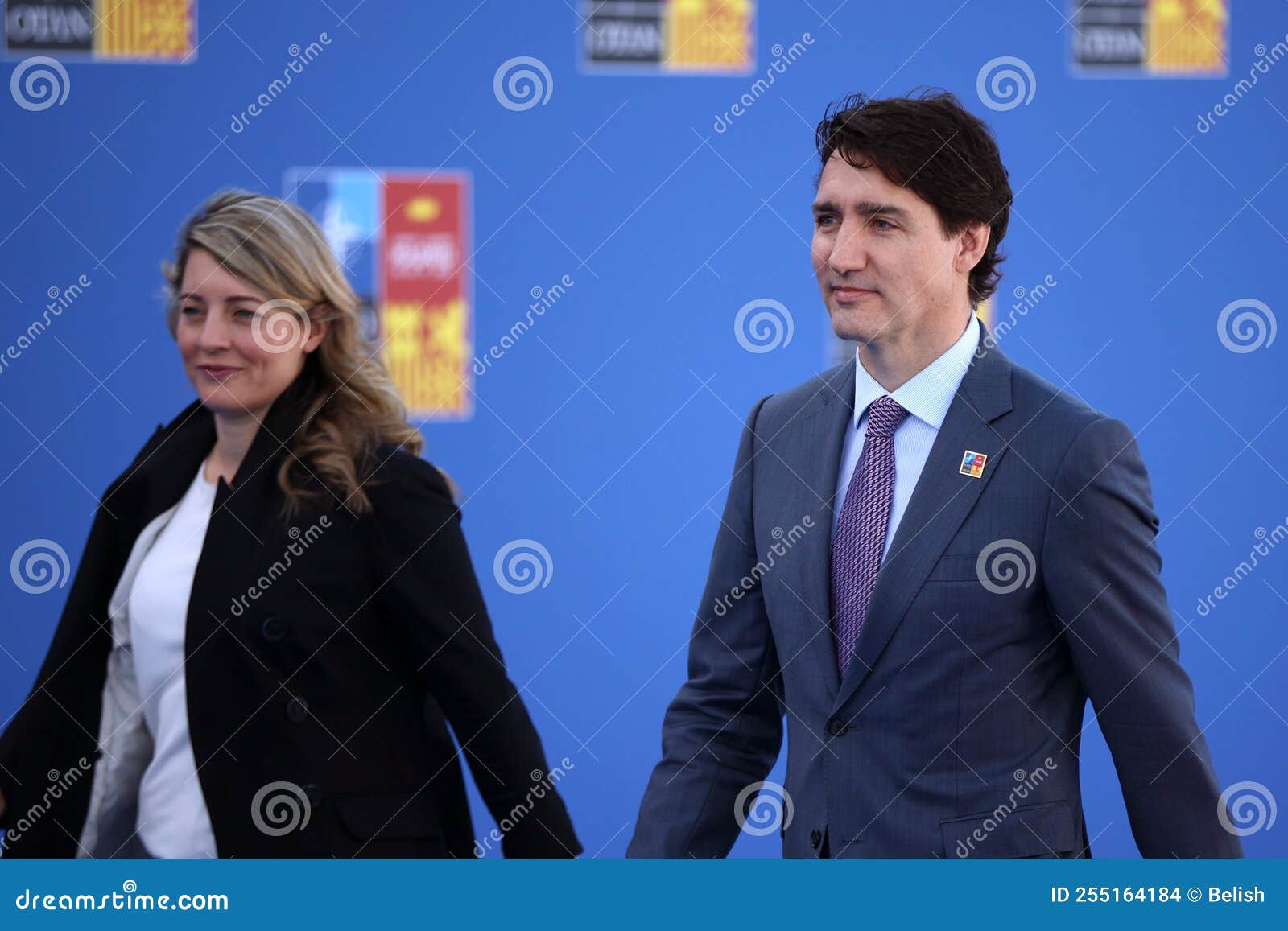Mélanie Joly and Justin Trudeau are two prominent figures in Canadian politics, each playing a pivotal role in shaping the country's future. Mélanie Joly, a dynamic and accomplished politician, has carved her niche as a Minister in Trudeau’s cabinet, while Justin Trudeau, the charismatic Prime Minister of Canada, continues to lead the nation with his progressive vision. Together, they represent the modern face of Canadian governance, balancing innovation with tradition. Their collaboration has been instrumental in advancing key policies, particularly in areas like culture, foreign affairs, and climate action. Understanding their contributions offers valuable insights into the inner workings of Canada's political landscape.
Mélanie Joly, born in Montreal, has risen through the ranks of Canadian politics with her passion for public service and her commitment to fostering cultural growth. Her journey from a communications professional to a key figure in the Liberal Party highlights her adaptability and leadership skills. As a Minister, Joly has championed initiatives that promote Canadian identity, support the creative industries, and strengthen international ties. Her partnership with Justin Trudeau has been particularly noteworthy, as they share a vision of a more inclusive and sustainable Canada. Their combined efforts have resonated with Canadians, making them influential voices on both domestic and global platforms.
Justin Trudeau, the son of former Prime Minister Pierre Trudeau, has been a transformative figure in Canadian politics since his election in 2015. Known for his progressive policies and emphasis on diversity, Trudeau has consistently advocated for issues such as gender equality, climate change, and Indigenous reconciliation. His leadership style, often described as collaborative and empathetic, aligns well with Joly’s approach to governance. Together, they have navigated complex challenges, from the pandemic to geopolitical tensions, while striving to uphold Canada’s values. Their shared commitment to innovation and inclusivity has positioned them as key players in shaping the nation’s trajectory.
Read also:Perfecting Your Steak A Complete Guide To Internal Steak Temp
Table of Contents
- Biography of Mélanie Joly
- Biography of Justin Trudeau
- What Are the Key Achievements of Mélanie Joly?
- How Has Justin Trudeau Shaped Canadian Politics?
- What Is the Collaboration Between Mélanie Joly and Justin Trudeau Like?
- How Do Mélanie Joly and Justin Trudeau Engage with the Public?
- What Are the Challenges Faced by Mélanie Joly and Justin Trudeau?
- FAQs
Biography of Mélanie Joly
Mélanie Joly, a prominent Canadian politician, has established herself as a key figure in the Liberal Party and a steadfast advocate for Canadian culture and international relations. Born on May 27, 1979, in Montreal, Quebec, Joly grew up in a bilingual household, which instilled in her a deep appreciation for Canada's diverse cultural fabric. Her early education at Collège Jean-de-Brébeuf and later at the Université de Montréal, where she earned a law degree, laid the foundation for her career in public service. Before entering politics, Joly worked as a lawyer and a communications strategist, skills that would later prove invaluable in her political journey.
Joly's political career began in earnest when she was elected as the Member of Parliament (MP) for Ahuntsic-Cartierville in 2015. Her rise within the Liberal Party was swift, and she was soon appointed as the Minister of Canadian Heritage, a role in which she championed the preservation and promotion of Canadian arts, culture, and media. Over the years, she has held several ministerial positions, including Minister of Economic Development, Innovation, and Export Trade, and most recently, Minister of Foreign Affairs. Each role has allowed her to contribute to Canada's growth and global standing, showcasing her versatility and commitment to public service.
| Full Name | Mélanie Joly |
|---|---|
| Date of Birth | May 27, 1979 |
| Place of Birth | Montreal, Quebec, Canada |
| Political Party | Liberal Party of Canada |
| Current Position | Minister of Foreign Affairs |
| Education | Université de Montréal (Law Degree) |
| Spouse | Thomas D'Amico |
| Children | One child |
Biography of Justin Trudeau
Justin Trudeau, the 23rd Prime Minister of Canada, is a name synonymous with leadership, progressivism, and a vision for a better future. Born on December 25, 1971, in Ottawa, Ontario, Trudeau is the eldest son of former Prime Minister Pierre Trudeau, a legacy that has both shaped and challenged his political career. Growing up in the public eye, Trudeau developed a deep understanding of Canadian politics and governance from an early age. After completing his education at McGill University, where he earned a Bachelor of Arts in Literature, and later at the University of British Columbia, where he obtained a Bachelor of Education, Trudeau initially pursued a career as a teacher and snowboarding instructor before entering politics.
Trudeau's political journey began in earnest when he was elected as the Member of Parliament (MP) for the riding of Papineau in 2008. His charisma, relatability, and progressive ideals quickly made him a rising star within the Liberal Party. In 2013, he was elected as the leader of the Liberal Party, and in 2015, he led the party to a historic victory, becoming the Prime Minister of Canada. Under his leadership, Trudeau has championed policies focused on diversity, inclusion, and climate action, earning him both praise and criticism. His tenure has been marked by efforts to address systemic issues such as Indigenous reconciliation, gender equality, and global cooperation, making him a central figure in modern Canadian politics.
What Are the Key Achievements of Mélanie Joly?
Mélanie Joly has achieved significant milestones throughout her political career, particularly in her roles as Minister of Canadian Heritage and Minister of Foreign Affairs. Her accomplishments reflect her dedication to fostering Canadian culture, promoting economic development, and strengthening international relations. These achievements have not only solidified her reputation as a capable leader but have also contributed to Canada’s global standing. Below are some of her key accomplishments in these areas.
Advancing Canadian Culture
As Minister of Canadian Heritage, Mélanie Joly played a pivotal role in revitalizing Canada’s cultural industries. She spearheaded the development of the Creative Canada Policy Framework, a comprehensive strategy aimed at supporting artists, creators, and media organizations. One of her most notable achievements was the introduction of the Canada Media Fund and the Canada Music Fund, which provided critical financial support to Canadian artists and producers. These initiatives helped ensure that Canadian voices and stories remained vibrant and accessible in an increasingly globalized media landscape.
Read also:Discovering Where Is O Block A Comprehensive Guide To Its Location And Significance
Joly also championed the Broadcasting Act reforms, which sought to modernize Canada’s broadcasting regulations to reflect the digital age. These reforms aimed to ensure that streaming platforms contributed to Canadian content while promoting linguistic duality and cultural diversity. Her efforts were widely praised by artists and industry stakeholders, as they addressed the challenges posed by the rapid evolution of digital media. Additionally, Joly’s work in promoting Indigenous languages and cultures as part of Canada’s reconciliation efforts further underscored her commitment to inclusivity and representation.
Strengthening International Relations
In her role as Minister of Foreign Affairs, Mélanie Joly has been instrumental in advancing Canada’s interests on the global stage. One of her key achievements has been her leadership in promoting Canada’s commitment to multilateralism and international cooperation. Under her guidance, Canada has played an active role in addressing global challenges such as climate change, human rights, and peacekeeping efforts. Joly has also prioritized strengthening Canada’s ties with key allies, including the United States and European nations, while fostering new partnerships in emerging markets.
Joly’s diplomatic efforts have been particularly evident in her work on the Indo-Pacific strategy, where she has emphasized the importance of economic engagement and security in the region. She has also been a vocal advocate for gender equality and human rights on the international stage, often using her platform to call attention to issues such as violence against women and the rights of marginalized communities. Her ability to navigate complex geopolitical dynamics has earned her respect both domestically and internationally, reinforcing Canada’s reputation as a leader in global diplomacy.
How Has Justin Trudeau Shaped Canadian Politics?
Justin Trudeau’s tenure as Prime Minister of Canada has been marked by a transformative approach to governance, characterized by progressive policies and a commitment to inclusivity. His leadership style, often described as collaborative and empathetic, has reshaped Canadian politics by prioritizing issues such as diversity, climate action, and Indigenous reconciliation. These efforts have not only redefined Canada’s domestic agenda but have also positioned the country as a global leader in addressing pressing challenges. Below are some of the key areas where Trudeau’s influence has been most evident.
Progressive Policies and Diversity
One of Justin Trudeau’s most significant contributions to Canadian politics has been his emphasis on progressive policies that promote diversity and inclusion. From the outset of his leadership, Trudeau has championed gender equality, appointing Canada’s first gender-balanced cabinet in 2015. This move set a precedent for representation in government and underscored his commitment to empowering women in leadership roles. Trudeau has also been a vocal advocate for LGBTQ+ rights, including the introduction of legislation to ban conversion therapy and the legalization of same-sex marriage during his tenure.
Trudeau’s focus on diversity extends beyond gender and sexual orientation. He has worked to address systemic racism and discrimination by implementing policies that support minority communities, including Indigenous peoples, racialized groups, and immigrants. His government has introduced measures to combat Islamophobia, promote multiculturalism, and enhance access to opportunities for marginalized populations. These efforts have been complemented by initiatives to reform Canada’s immigration system, making it more inclusive and responsive to the needs of newcomers. By prioritizing diversity, Trudeau has sought to create a more equitable and cohesive society, reflecting Canada’s values as a multicultural nation.
Climate Action and Global Leadership
Another cornerstone of Justin Trudeau’s political legacy is his commitment to climate action and global leadership. Recognizing the urgency of the climate crisis, Trudeau has implemented several policies aimed at reducing Canada’s carbon footprint and transitioning to a sustainable economy. One of his most notable initiatives was the introduction of a national carbon pricing system, which has been instrumental in incentivizing businesses and individuals to adopt greener practices. Additionally, his government has invested heavily in renewable energy projects, public transportation, and green infrastructure, positioning Canada as a leader in the fight against climate change.
On the global stage, Trudeau has been a vocal advocate for international cooperation to address environmental challenges. He played a key role in negotiating the Paris Agreement and has consistently called for stronger commitments from countries to meet their climate targets. Trudeau has also prioritized partnerships with Indigenous communities in Canada to ensure that climate policies are developed in a way that respects their rights and traditional knowledge. His leadership in this area has earned him recognition as a champion of environmental stewardship, although it has also drawn criticism from those who argue that Canada’s fossil fuel industry remains a significant contributor to greenhouse gas emissions. Despite these challenges, Trudeau’s efforts have underscored the importance of balancing economic growth with environmental responsibility.
What Is the

